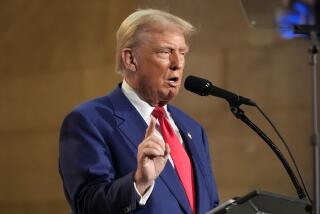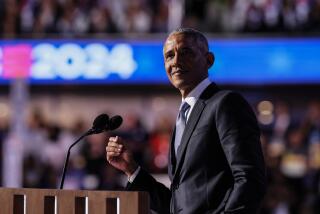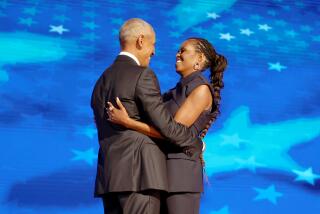Obama’s jobs plan to reflect his more modest ambition
When he accepted the Democratic presidential nomination, Barack Obama made a prediction breathtaking in its ambition: Americans would look back at that night in Denver as the moment when “the planet began to heal” and the country began to provide “good jobs to the jobless.”
Obama will deliver another speech to the nation Thursday, with his sights significantly lower and the scope sharply curtailed.
He’ll roll out a new plan to revive the economy: a mix of tax credits and targeted spending increases for school renovation and job training amounting to about $300 billion. Obama bills it as a sensible proposal that Republicans could conceivably endorse.
Some economists familiar with the plan believe it could move the needle on unemployment over the next few months.
If Congress rejects it, some of Obama’s aides believe it could move the political needle in their direction. A defeated plan, they hope, could become a political trap for Republicans, allowing Obama to portray the GOP as so intent on foiling the White House that they would sabotage economic progress.
“The president will present a meaningful, responsible set of ideas to create jobs and grow the economy,” a senior White House advisor said. “The Republican Congress will have a choice whether they’re going to work with the president to achieve those goals or play politics. If they choose to play politics, the president will go to the country and explain who’s stopping progress and why.”
But in either case — as an economic proposal that might improve the jobs outlook or as a political stratagem that might help his reelection effort — Thursday’s speech is a long step from the vaulting ambitions that accompanied Obama’s rise.
That shift underscores the extent to which his options have narrowed.
Obama can’t run for reelection as a transformational president: The country has lost nearly 2.5 million jobs in the last three years and unemployment stands at 9.1%. His healthcare overhaul could be undone by the courts before it even fully takes effect.
Nor can he come out with a proposal that would make a major dent in unemployment right away. That would require another round of stimulus, a dirty word in today’s political vocabulary.
So he’s left with a jobs plan of modest proportions whose chief political value is that Republicans might look obstinate for opposing it.
But Republicans see Obama’s moves as signs of weak leadership. A once-audacious politician now looks timid in the face of wrenching crises, Republicans contend.
“His campaign back in 2008 sold everyone this grand theory of a transformational presidency,” said Kevin Madden, a Republican strategist who worked for former Massachusetts Gov. Mitt Romney that year. “But what we’re left with right now is just a conventional politician doing whatever it takes to get himself reelected.”
But the low-key pragmatism that the White House has attempted to follow — searching for proposals that just might win Republican support — also angers many Democratic loyalists. They say that in the face of divided government, Obama isn’t aiming high enough.
Many Democrats expect Republicans to oppose Obama no matter what he does, so they’d prefer that he demand a plan that would take a bolder approach to creating jobs. Rep. Emanuel Cleaver II (D-Mo.), in a conversation earlier in the week with White House Chief of Staff William Daley, gave a football analogy. If the player is going to get a penalty no matter what he does, why not deliver a hard hit?
“The president’s going to get hit when he introduces his proposal,” Cleaver said, recounting the conversation, “so he might as well introduce something big and impactful, because they’re going to come after him anyway.”
Cleaver also said the president must campaign hard for the package and take the fight directly to Republicans.
On that point, Obama may accommodate. Less than 24 hours after his speech, he’ll talk up the new jobs plan in Richmond, Va., the political turf of Republican House Majority Leader Eric Cantor.
White House officials maintain that the president didn’t hold back on his proposal. Obama crafted a practical plan not hemmed in by political considerations, said White House Press Secretary Jay Carney.
“There’s not an infinite universe of things you could do,” Carney said, “even if you had endless amounts of money.”
Economists familiar with the plan say it could have a positive effect on the jobs outlook. “And, at least in normal times, it would have bipartisan support,” said Jared Bernstein, former top economic advisor to Vice President Joe Biden.
Administration officials also think voters know the problems are complicated and do not expect Obama to solve the nation’s economic troubles entirely by 2012. The public simply wants to see progress, the thinking goes. That means the most crucial time is between now and the end of the year, when Congress would have to act in order for any of Obama’s plans to take effect.
But Republican strategists think the president’s big moment is Thursday night.
“He has said this is going to be a major policy address that’s going to fix our economy,” said Ed Gillespie, a GOP strategist and former counselor to President George W. Bush. “If he doesn’t do those things, then I think the American people are going to go, ‘What was that all about?’ And it’s going to reinforce this concern about his leadership.”
Even ardent supporters of the president wonder whether the new jobs plan will be adequate to turn around perceptions of his presidency. Sen. Richard J. Durbin (D-Ill.) said Obama called him Tuesday and spoke in general terms about the forthcoming proposals.
Given the history of the stimulus — a $787-billion package passed in early 2009 that may have kept the economy from getting drastically worse but didn’t cure it — there’s no guarantee the new plan will make much of a dent, Durbin said.
The original stimulus package didn’t do enough, Durbin said.
“It stemmed the bleeding for a short period, but it didn’t turn the tide,” he said. “For anything less than that, you just have to keep your fingers crossed that it’s the right thing at the right moment.”
Lisa Mascaro in the Washington bureau contributed to this report.
More to Read
Sign up for Essential California
The most important California stories and recommendations in your inbox every morning.
You may occasionally receive promotional content from the Los Angeles Times.











